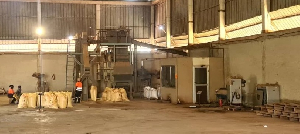Two major soyabean processing plants in the Ashanti Region are facing possible closure due to severe shortages of their primary raw material, occasioned by huge exports despite government restrictions.
Vester Oil Mills Limited in Kuntenase-Deduako and Thomas W. Bello Enterprise, operating in the Bosomtwe District and Asokwa Municipality respectively, have been forced to drastically reduce their workforce.
The shortage has created a ripple effect across multiple sectors, particularly affecting poultry, aquaculture, and livestock industries that depend heavily on soyabean products for animal feed.
During a visit by The Ghanaian Times on Monday, Vester Oil Mills was found operating with just 30 of its usual 150 workers while Thomas W. Bello Enterprise had laid off 80 of its 120 employees.
In an interview, Chief Executive Officer (CEO) of Vester Oil Mills Limited, Kwasi Nyamekye, said they extract oil from soyabeans as their main product, with soya cake as a byproduct for the poultry industry.
However , he said, there had not been any production for almost four months due to the shortage of raw materials, leaving no option but to lay off workers.
Mr Nyamekye, also the Zonal Chairman (Ashanti, Bono, Ahafo) of the Association of Ghana Industries (AGI), blamed the shortage of soyabeans on foreigners exporting the produce.
Mr Thomas Bello of Thomas W. Bello Enterprise attributed the shortage to what he described as an “unbridled export drive” of soyabeans by Chinese and Indians.
According to him, his main production was soya cake for the poultry industry, with oil production as a byproduct.
Mr Bello, who is also the President of the Soya Value Chain Association of Ghana, admitted that the government’s Planting for Food and Jobs Initiative assisted members in producing soyabeans in abundance for the last two years, “but it is a surprise the initiative has taken a nosedive.”
In his view, there should not have been any shortage, even though the Planting for Food and Jobs Initiative was not as successful as expected, attributing the current situation to crop exportation, especially by foreigners.
The two CEOs have, therefore, urged the government to reinforce the ban and particularly monitor the borders, claiming that the produce is being smuggled to neighbouring countries, especially Togo, for export.
They expressed worry about the ongoing exportation despite the ban but were hopeful the government would stem the tide to help sustain the industry.
The Export and Import Restriction of Soybeans Regulation was passed by Parliament in October 2020 to regulate the export of soyabeans, and it came into effect on December 22, 2020.
In August 2024, the government again announced a ban on the export of grains, including soyabeans, to ensure food security in the country.
The ban was also to ensure the availability of soyabeans for domestic use and to meet local processing requirements for animal production.
The country’s soyabean production potential stands at an impressive 700,000 tonnes per year, but currently, only about 26 per cent of this potential is being realised.
Business News of Thursday, 24 October 2024
Source: ghanaiantimes.com.gh













